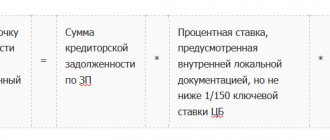What is the danger of dismissal without the employee’s consent?
It happens that an employee does not want to write a statement of his own free will and leave peacefully. The entrepreneur has to look for an article for dismissal. An entry in the work book becomes a stigma that makes it difficult to find a new job. And the person devotes himself to the showdown: he finds a lawyer, complains to the labor inspectorate, the prosecutor’s office and the court.
If the employee is dismissed due to mistakes, they will be returned. The employer will pay wages during the dispute under Art. 234 of the Labor Code of the Russian Federation and a fine to the state under Art. 5.27 Code of Administrative Offenses of the Russian Federation. And for the dismissal of a pregnant woman and a woman with children under three years of age, a criminal case is opened under Art. 145 of the Criminal Code of the Russian Federation.
It's safest to do this. Dismiss for a real reason and correctly draw up personnel documents.
Some employees should not be fired
Not everyone can be fired without a statement of their own free will. There are workers with immunity.
pregnant women - Art. 261 Labor Code of the Russian Federation. Even for absenteeism, rudeness and shortages at the cash register. The exception is when the company closes.
Mothers with children under three years old, and without a husband - up to fourteen years old, cannot be laid off or fired for low qualifications. A complete list of protected family workers is in Art. 261 Labor Code of the Russian Federation.
on sick leave or vacation is not fired. We have to wait to go to work. Vacation is considered not only four weeks a year, but also maternity leave, days without pay and going to session.
A minor is fired only with the consent of the labor inspectorate or commission for minors in his city - Art. 269 Labor Code of the Russian Federation. If officials are against it, the person continues to work.
Submit reports without accounting knowledge
Elba is suitable for individual entrepreneurs and LLCs with employees. The service will prepare all the necessary reporting, calculate salaries, taxes and contributions, and generate payments.
Try 30 days free Gift for new entrepreneurs
Why are toxic employees dangerous?
They are like snakes: they poison colleagues, the work atmosphere, and the general psychological climate in the team with their poison. This is if in general. In addition, toxic employees interfere with work in the following specific ways :
- demotivate the team. This is especially pronounced if the toxic employee is a charismatic person who is able to lead others. Word after word, sabotage after sabotage, and now executive workers are already dancing to the tune of one, stronger one;
- cause a split. If there are other dissatisfied people in the team, you can bet anything that they will unite and form an opposition “committee”. This is fraught with a split in the team, division into opposition parties and general discord. Nothing good will come of this. It happened that after such a split, people left companies in whole groups;
- undermine the authority of the leader. And this is true: if the boss, for some reason, tolerates such a person in the team, it means he cannot cope with her. Subordinates are not fools and will quickly recognize this weakness;
- interfere with the work of normal employees. When passions run high in a team, one half expresses dissatisfaction, the other fights with them, how can they normally fulfill their duties? Even if a peaceful employee is not involved in the fight, office wars still affect his mood and performance;
- slow down and complicate business processes. When one important part in the car breaks down, the car does not drive or drives poorly. It’s the same in a company: one disrupted business process leads to others, and as a result, work slows down or stops altogether.
In general, you understand. Now let's look at what types of toxic employees are most common and how to get along with them . We are not considering the “fire immediately” option: we are civilized people, let’s try in an amicable way first. Dismissal remains a last resort, but it may come to that.
By agreement of the parties - Art. 78 Labor Code of the Russian Federation
By agreement of the parties - when the employee and employer agree to part ways.
You can offer the employee an agreement with mutual benefit. For example, an employer pays a small bonus, but an employee hands over documents to colleagues and doesn’t come back tomorrow.
The method is convenient: it gets rid of the employee without unnecessary paperwork and procedures. You cannot refuse a signed agreement, unlike a statement of your own free will (there are two weeks to change your mind). But there are still risks.
The court will cancel the agreement if the employee says that he was pressured. Bring witnesses or show correspondence. Therefore, it is better to offer conditions in writing.
How to deal with a destructive employee
Disruptive employees typically fall into Category #1: “shoot immediately,” or Category #2. If we don’t yet have anyone to replace this employee, let him sit there for now. We don’t fight devils, this shouldn’t be done, if the devil is still needed, we transfer it not to the first category, but to the second, we don’t touch it.
Because never take on a job if you don’t have the resources to do it. And you won’t get the job done, and you’ll lose your authority. Therefore, in some cases, it is very wise not to climb onto the locomotive with a fork . Because this is not courage, but stupidity.
That is, if you clearly see that you have neither the desire nor the resources to force a person into the desired behavior, but until you consider it right to fire him, ignore him. But from a position of strength, not from a position of weakness. From a position of strength, this is when a strong person considers it completely unnecessary to pay attention to an antisocial pattern of behavior. Not to pay attention, not because you are afraid, but not to pay attention because, in fact, what should you pay attention to?
The man shows that he is a fool. Why should I help him with this, and it’s clear that he’s a fool. And often those around you understand this.
A reaction from a position of strength is when a leader ignores inappropriate actions, but not because he is afraid, but because it is beneath his dignity to react to stupidity. For what? Therefore, it doesn’t matter how you react, what matters is whether you react from strength or from weakness.
Reaction from weakness: “What could I do? He publicly challenged me . So what? He dropped it, no need to pick it up.
Just ignore the call, you can chuckle.
You can look at a person mockingly, you can shrug your shoulders, turn your gaze to others and continue the conversation. And thereby kill a person. Because he expected a reaction, but there was no reaction .
What to react to? As they say, stand on white paper, you are hard to see. There are some lines, some phrases, some actions. You can be higher than this, but higher by force, that is, you noticed, were so surprised, but did not react.
This interesting model of behavior is described in the book “Peter 1”. There is an episode when a certain spy comes running to Princess Sophia and says that Peter escaped from Preobrazhenskoye in his underwear. To which she responded with a phrase such as the video: “He’s free to run naked through the forest.”
And in some cases, such a reaction to someone’s behavior helps a lot.
A person is free to make a fool of himself. What should you react to? The fact that a person has shown that he is a fool is his problem. Why should I waste time on this? For what?
Well, he had to point out... To what? The fact that he is behaving incorrectly... Why? Well, sometimes subordinates ask:
-Why didn’t you stop him?
The manager's condescending look, look back, and ask:
-Did you pull it? I mean, well, he did it like that? -Well, yes, so what?
And the subordinate is already beginning to understand something, well, your friend or close associate.
- Well, he said that in front of everyone... - Well, yes, so what? -But you had to do something? -For what?
And the subordinate thinks, really, why? And then you can ask a subordinate, who, as a rule, will tell others about it. Ask:
-But do you think it was smart of him? - No, what are you talking about?
Well, here's the answer. Why react to stupid actions. Why give public attention to stupid actions.
And if you need to fire such an employee, then the right thing to do is to do it unemotionally. The worst thing is unemotionality , unemotionality is a sign of strength.
But if the manager begins to say emotionally: “Because he committed an act incompatible with the honor of the company, and this will happen to everyone, and this is a clear example, etc.”
This is a sign of weakness.
The leader shows that he is hurt , very hurt, indignant.
That is, he was hooked, and he is afraid that others will behave the same way. And this is fear. How to get rid of fear yourself is described here. A sign of strength is when there is a short comment that the person was fired for behavior incompatible with the ethics of the company. Dot.
Alexander Fedotov
List of all articles here >>>
For failure to fulfill labor duties and discipline - clause 5 of Art. 81 Labor Code of the Russian Federation
Each employee is obliged to fulfill job duties and not violate discipline.
Responsibilities are written in the employment contract and job description. For example, a salesperson advises clients, accepts money, and sends requests to suppliers.
Discipline is working hours, dress code, rules of communication with colleagues. Discipline is stated in the employment contract and internal regulations (if applicable).
For violation of duties and discipline, a reprimand or reprimand is given. The seller did not return the check - a reprimand, was late for a shift - a reprimand. This is called disciplinary action under Art. 192 Labor Code of the Russian Federation.
When two or more reprimands and comments have accumulated, the employee can be fired. The reason is called “for repeated failure by an employee to fulfill his job duties without good reason.” Suitable for dismissal for poor work, rudeness with clients, lateness.
To be dismissed, you must file a disciplinary sanction at least twice within a year. This is done according to Art. 193 Labor Code of the Russian Federation:
- Record the employee’s misconduct - with a memo about being late, an act of failure to fulfill an obligation.
- Get the employee to explain why this happened. The request is submitted against signature. Then they wait two days, if the person is silent, they issue an act of refusal.
- Issue an order for a reprimand or reprimand.
The order is made no later than one month from the discovery of the offense and six months from its commission. Vacation and sick leave time is not counted. The employee is notified of the order within three days. If he rebels, he makes an act of refusal. If you violate the deadlines, the collection will not work.
Example: a manager collected an employee’s mistakes and fired him
A full-time developer did not deliver the work on time and disrupted the delivery of the entire department’s project. He received a reprimand. Then he left work 40 minutes early - a reprimand.
The company collected two orders and fired for failure to fulfill duties. It was not possible to challenge it - case No. 33-19370.
Article about employee responsibility
For absenteeism and alcohol - clause 6 of Art. 81 Labor Code of the Russian Federation
Violations of discipline can be serious. For one rude thing you can be fired immediately. This is also a disciplinary sanction. But there is no need to save the previous ones.
All gross violations are recorded in paragraph 6 of Art. 81 Labor Code of the Russian Federation. These include absenteeism and alcohol or drug intoxication at work.
A gross violation is documented in the same way as a simple violation. A memo or act, explanation, order of dismissal no later than a month from discovery.
Absenteeism
Absenteeism is when a person does not come to work or is absent for four hours in a row.
There is no good reason for absenteeism: illness, accident, death of a relative. Time off and vacations without the request of the manager are also considered absenteeism. This is explained in paragraph 39 of the Resolution of the Plenum of the Armed Forces of the Russian Federation dated March 17, 2004 No. 2.
Example of absenteeism:
A specialist at a bank on the eve of a working day at 11:30 pm asked the director for a day off via a WhatsApp message. Silence was considered consent. When she returned to work, she was given absenteeism and fired.
The specialist appealed the absenteeism, but the court did not return the job.
The time off was not approved, which means it’s absenteeism. There is an absence from work report and a memo from the director, an explanation, an order. We met the deadlines. Dismissal for absenteeism is fair and documented correctly - case 33-12011/2019.
Intoxication
Alcohol and drug intoxication must be proven.
The act with witnesses is suitable. The court believed the witnesses that the store clerk was drunk behind the counter - case No. 33-5383/10.
The stronger option is a breathalyzer or a doctor’s report. For example, a breathalyzer helped in a dispute about the dismissal of a trolleybus driver - case No. 2-3639/2018. There is a possibility - take a test or call a doctor.
WHO IS REQUIRED TO PROVIDE A CERTIFICATES FROM A PSYCHIATRIATIST AND NARCOLOGIST WHEN EMPLOYMENT
A certificate from a psychiatrist and narcologist are documents confirming your mental health and sanity, the absence of addictions.
Accordingly, a narcologist is free from drug and alcohol addiction and gives permission to work. In some cases, drug test results may be included.
And the psychiatrist checks whether you are registered with diseases that prohibit work in the position you have chosen. And the validity of a certificate from a psychiatrist for employment is one year.
In order to prevent harm to others, there are mandatory professions that are required to visit a psychiatrist and narcologist upon hiring and provide the employer with health certificates. I will give the most common directions of them:
- law enforcement agencies;
- private or public security companies;
- drivers of public or private transport;
- work in preschool institutions and schools;
- swimming coaches and instructors;
- carrying a weapon;
- registration of guardianship.
For loss of confidence in dealing with money and goods - clause 7 of Art. 81 Labor Code of the Russian Federation
Employees are responsible for the money and goods they work with. For shortages, shortchanging customers, selling without receipts and outright theft, you can be fired.
Shortages are documented with an inventory, other violations are documented with acts and memos. An explanation is taken from the employee and dismissed no later than a month after the misconduct is discovered.
How to correctly draw up full liability agreements
Reduction of staff - clause 2 of Art. 81
The essence of staff reduction is as follows. The employer says: “I don’t need so many workers anymore. I'll fire you too. I give time to find a job, help with money and fire.”
Reduction is suitable when the company has fewer orders. For example, the hotel saw a decrease in the flow of tourists and eliminated one administrator position - case No. 33-1805/2013.
How many employees to keep is up to the entrepreneur. I wanted to and cut it. This is stated in the Determination of the Constitutional Court of the Russian Federation dated September 24, 2012 No. 1690-O.
The reduction procedure is as follows. The employee is given a personal notice of layoff, and he works for another two months for a salary under Art. 180 Labor Code of the Russian Federation. Two months later they issue a dismissal order. Before the layoff, the person is offered other vacancies in the company, if any.
The dismissed person is paid two average earnings according to Art. 178 Labor Code of the Russian Federation. If in a month he does not find a job and brings a certificate from the employment center, they add another one. If the employee agrees, they are fired earlier with an increased salary.
Those who perform worse are laid off first. For example, if the bartender has less income than the shift worker, he is fired. If everyone works the same, the employee without dependents is fired. Details about the selection of people for layoffs are written in Art. 179 Labor Code of the Russian Federation.
Other grounds for dismissal
We talked about layoffs, which are common in any business. But there are much more reasons in the Labor Code. Here is a list of rare, but also real, articles for dismissal:
— Liquidation of a company, closure of an individual entrepreneur — clause 1 of Art. 81 Labor Code of the Russian Federation;
- The employee forged a diploma or work record when he was getting a job - clause 11 of Art. 81, art. 84 Labor Code of the Russian Federation;
- Failed the knowledge test - clause 3 of Art. 81 Labor Code of the Russian Federation;
- The employee is drafted into the army or his driver’s license is taken away, and he is a driver - art. 83 Labor Code of the Russian Federation;
- Part-time worker, and you found a permanent one - art. 288 Labor Code of the Russian Federation.
Termination of a contract with an employee without his consent
Employers do not always act in good conscience when they try to fire employees they don’t like. But in order to avoid problems with the law, it is necessary to distinguish the arbitrariness of the manager from the legal grounds for dismissal.
The first situation includes termination of an employment contract:
- on grounds not specified in the Labor Code of the Russian Federation or other federal laws;
- on grounds prohibiting the dismissal of a certain group of employees (on the initiative of the employer, it is impossible to terminate a contract with pregnant women, including on the grounds of her situation, it is impossible to dismiss a pre-retirement person for reaching a certain age);
- on fictitious grounds (dismissal “under article” without proper evidence of the employee’s guilt);
- with violations of the procedure for terminating an employment contract (missing deadlines during liquidation or layoffs, layoffs of employees with immunity, errors in personnel documents, etc.);
- based on forcing an employee to leave of his own free will or to sign a resignation agreement.
The listed actions of the employer are illegal. An employee who has been fired from work in this way or who just wants to terminate his contract has the right to protect his rights by filing a complaint with the labor inspectorate or the prosecutor's office.
Important! Legitimate reasons for dismissal are listed in the norms of labor legislation (Chapter 13 of the Labor Code of the Russian Federation and certain articles regulating the termination of employment relations in certain areas of activity).
A manager can fire an employee in a suitable situation, but only if there is a reason, for example:
- a gross violation recorded in writing (a report is drawn up, and the employee writes an explanatory note);
- the guilt of the materially responsible employee for the shortage has been proven by the commission;
- the employee himself submitted an application of his own free will (“Please dismiss me of my own free will”) without coercion from the employer or signed a dismissal agreement, etc.
The document justifying the dismissal is indicated in the Order of Dismissal. The employer writes down the date and number of the document, according to which an inspection or court can subsequently easily verify the legality of termination of the employment relationship.
Possible grounds under the law
How can you fire an employee if he doesn't want to? An employee can be dismissed from work without his consent only on the grounds listed:
- in labor legislation (Chapter 13 of the Labor Code of the Russian Federation, Article 278, Article 332 of the Labor Code of the Russian Federation, etc.);
- in the Federal Laws regulating the activities of individual employees (Federal Law No. 342 “On service in internal affairs bodies ...”, Federal Law No. 79 “On the state civil service”, etc.).
An employer may dismiss an employee on its own initiative in accordance with Art. 81 Labor Code of the Russian Federation:
- staff reduction (if the employee does not fall into the categories specified in Articles 179 and 261 of the Labor Code of the Russian Federation);
- inadequacy for the position held (an unsatisfactory test or certification result will be required);
- loss of trust (applies only to employees with full financial responsibility and provided that they committed an action that served as a reason for mistrust);
- repeated failure to fulfill official duties, tardiness (must be recorded in an act, disciplinary action will also be required);
- a one-time gross violation of labor discipline (absenteeism, appearing drunk at work, etc., recorded in an act).
Another method of dismissal is an unsatisfactory test result , if the employee was provided with an internship under the employment contract. During it, a curator or a whole commission is assigned to the employee, which, during the trial period, checks his skills and abilities and records violations in a special act. On its basis, the employment contract is terminated (Part 2 of Article 71 of the Labor Code of the Russian Federation).
You can part with an employee without being fired “under the article”.
Important! The employer has the right to offer to terminate the contract by agreement of the parties by offering the employee severance pay.
He may hint at leaving of his own free will, but in no case should you insist or try to “squeeze” the employee out of the team: the manager will be held accountable for this.
Another type of dismissal is termination of a contract due to circumstances beyond the control of the parties (Article 83 of the Labor Code of the Russian Federation):
- illness of an employee (if he is a disabled person of group 1 or 2, and the medical commission has established a 3rd degree of disability);
- his conviction to imprisonment or other punishment that prevents him from going to work;
- loss of a special permit for more than 2 months (loss of a driver’s license, weapons permit), etc.
A separate issue is the dismissal of temporary workers and external part-time workers.
In the first case, you can fire:
- due to the expiration of the contract (Article 79 of the Labor Code of the Russian Federation);
- in connection with the return to work of the main employee.
In accordance with Art. 288 of the Labor Code of the Russian Federation, a part-time worker can be dismissed in connection with the hiring of an employee for whom the part-time position will become the main one.
Why can you part with someone you don’t want?
Thus, an undesirable employee can indeed be fired , but the employer must carefully consider certain points.
- Availability of foundation.
Without a document confirming the reason for dismissal, an employee cannot be removed.
- Deadlines.
In some situations, an employee must be notified of dismissal in advance:
- 3 days in advance - in case of dismissal due to the expiration of a fixed-term contract, in case of inadequacy for the position held or unsatisfactory test results;
- 2 weeks in advance - if a part-time worker is dismissed due to the hiring of a main employee;
- 2 months in advance - in case of liquidation of the organization or reduction.
In other cases, the employee is presented with a fait accompli.
- Offer of other positions.
Offering a transfer to another vacant position is the direct responsibility of the employer:
- in case of layoffs (must be proposed in a notification letter, and if new positions become available - before the end of the two-month period);
- upon dismissal of a temporary pregnant employee who was replacing another employee;
- upon dismissal for health reasons (it is necessary to offer a position that corresponds to the employee’s degree of ability to work).
- Correct design.
The Order, work book and other personnel documents must correctly reflect references to the grounds for dismissal (a norm of the Labor Code of the Russian Federation or other Federal Law). The employee must be familiarized with the Order by signature. You must also sign the notification documents.
- Calculation.
Upon dismissal at the initiative of the employer or at one’s own request, only the remaining salary is paid and unused vacation is compensated (Articles 127, 140 of the Labor Code of the Russian Federation).
Important! If an employee is fired due to reduction or liquidation, he is paid severance pay for the duration of employment (average monthly salary for 2, less often 3 months).
Severance pay can also be paid upon dismissal due to reduction in headcount or staffing. The size is determined by agreement.
Failure to pay a settlement is another violation, as a result of which the manager may be held accountable.
How to file a dismissal
On the last day of work, personnel documents are drawn up and salary arrears are paid. Do it as it is written in Art. 84.1 and 140 Labor Code of the Russian Federation:
- Print the dismissal order with the reason and an article from the Labor Code. The day after the order, the person no longer works for you.
- Let the employee read the order and ask him to sign the text. This is an important point that is often forgotten.
- Make an entry in your work book.
Article: how to make an entry in a work book
- Give your salary and compensation for vacation, otherwise penalties will accrue.
- Give out the work book, ask to sign for receipt.
- Copy the order to the employee at his request.
Coworker Survival Tips
- Initially, you must become the unofficial leader of the team, in which case you will be able to manipulate people, turn them against an unpleasant person.
- Blame the target for all the troubles, the main thing is to convince the entire team that it is this person who is to blame for the fact that there are no bonuses, that salaries are delayed, and so on.
- A rumor that a person wants to leave for another job works well; if this gossip reaches the boss, then if he is laid off, he will become the first candidate for departure, the boss loves people who value their position.
- Always question the professionalism of this person, especially if you are interested in people of higher positions, tell him that something is not working out for him, that he is an irresponsible slacker, it will be great if such conversations go around the office and reach the authorities.
- If the person you want to survive is in a higher position and is your boss, persuading the team to work more slowly will call into question his identity as a leader and respected leader.
- Point out to the target his mistakes, try to shame him, and preferably in public, the bosses should see how many mistakes a careless employee makes.
- This advice is suitable, again, if the person being scammed occupies a higher position. If you have any questions, contact the most important boss, then the question will arise about the competence of the object.
- Give an employee a task that is simply impossible to complete if it is your subordinate who is imposed by the boss.
- Do your work very quickly and efficiently, the boss should see what a great employee you are.
- Perhaps you will be able to gain access to the reports of the person you are targeting, and you will be able to ruin his documents. Any errors and incorrect numbers are a huge problem for the employee.
Editor's choice: What kind of business should a girl start: several ideas for young business ladies





